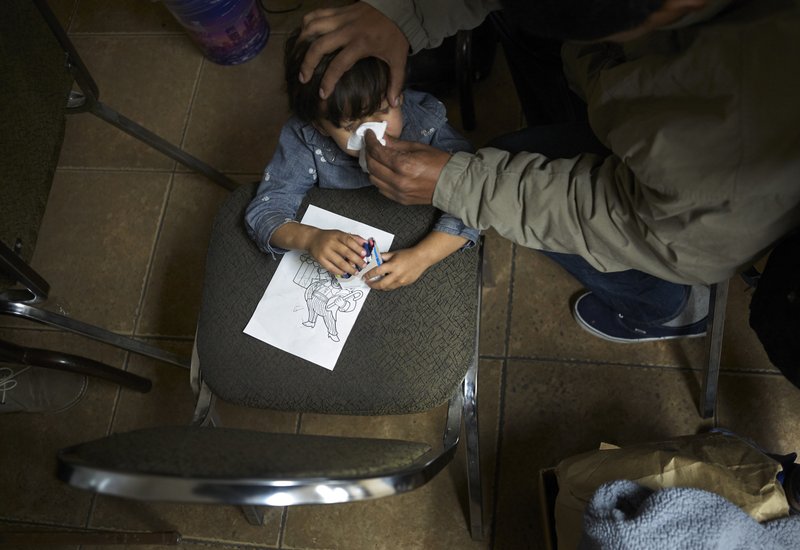SAN DIEGO -- President Donald Trump says he has ended "catch-and-release" for asylum seekers, but in cities on the U.S. border with Mexico, it is catch and can't release fast enough.
Since late October, the U.S. has been releasing asylum-seeking families so quickly that the families don't even have time to make travel arrangements. The U.S. blames the rapid releases on lack of detention space. Families are often given court dates without even having to pass initial screenings by asylum officers. They end up in shelters run by charities, or they are dropped off at bus stations in border cities.
For one Salvadoran family, that dizzying series of events began when their 7-year-old daughter, Yariza Flores, landed on barbed wire after being hoisted over a border fence during their illegal crossing last month. She was rushed to a San Diego hospital to stop profuse bleeding.
Four days later, U.S. authorities dropped her off at a San Diego shelter with her parents and 3-year-old brother. They had no money, the clothes on their backs and an order given to them during their stint in U.S. custody to appear in immigration court in Houston, where they planned to live with Yariza's grandmother and two aunts. They didn't even have time to arrange for relatives to buy bus tickets before they were released.
"I feel happy because we're finally here, we're finally going to see my family," the girl's mother, Tania Escobar, said in the shelter dining hall after a meal of shredded chicken, rice and beans. Her daughter sat nearby, all smiles, wearing a silver crown that a Border Patrol agent gave her and holding a stuffed animal from a doctor who treated the severe cuts on her lower back.
From California to Arizona to Texas, volunteers are scrambling to help families until they can arrange transportation to relatives across the U.S. The San Diego Rapid Response Network, an advocacy coalition that runs the shelter that housed Yariza and her family, has served more than 4,000 people since opening in a church in late October, moving five times since then because it ran out of space.
U.S. Immigration and Customs Enforcement often coordinates with these shelters. On the December night that Yariza arrived, the immigration agency delivered 125 people in buses that arrived every half-hour. One night during Christmas week, the facility received 180 people, forcing it to use a church for the overflow.
The Trump administration announced Dec. 20 that it would make asylum seekers who enter the U.S. on its southern border wait in Mexico while their claims wind through clogged immigration courts, which can take years. But that "catch and return" policy has yet to take effect while the two countries work on mechanics; a legal challenge appears likely.
So, for now, many asylum-seeking families are being released in the U.S. before even they are ready. Immigration and Customs Enforcement dropped off hundreds of people daily at a bus station in El Paso, Texas, over the holidays. In Tucson, Ariz., charities have rented motel rooms when shelters are full.
The immigration agency began shortening custody stays on Oct. 23 in response to the growing numbers of families crossing from Mexico. Officials say the agency previously ensured that families had travel plans first but that it's not legally required to do so.
"After decades of inaction by Congress, the government remains severely constrained in its ability to detain and promptly remove families with no legal basis to remain in the U.S.," said agency spokesman Sarah Rodriguez. "As a result, family units continue to cross the border at high volumes and are likely to continue to do so, as they face no consequence for their actions."
Yariza's family's journey began after the gangs that killed her great-uncle and threatened her grandmother gave her parents 24 hours to leave their home in the Salvadoran port city of La Libertad. Escobar, 25, said she and her husband decided they couldn't risk staying.
The family didn't want to wait weeks or months in Tijuana for U.S. authorities to process their claims at an official crossing, as U.S. authorities say asylum seekers should, so they crossed illegally.
The family took a taxi to a remote mountainous area with plans to surrender to a U.S. Border Patrol agent. Their search for an agent became urgent after Yariza's injury.
"We were so desperate," Escobar said. Then she added wistfully: "With God's help we will achieve what we asked for -- asylum."
A Section on 01/09/2019
